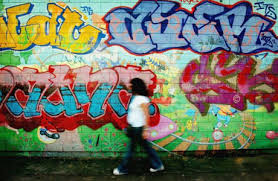
Here are the results of a research as reported in The Economist. The study was conducted byKees Keizer and his colleagues at the University of Groningen.
Some of you might click the link, but many won't. I don't, usually, unless I am given good reasons why I should.
So here are some:
It seems that during the '80s George Kelling, a former probation officer now working at Rutgers University, coined the “Broken Windows Theory” (read on, this has nothing to do with computers).
If the area you live in shows some signs of decay, such as broken windows kept unmended, more windows will get broken, and sooner or later some stranger will want to walk through one of those to take a look in. People do what they see others do, and they improve upon it. So if some small rule is violated today, may be it is an open invitation for crime tomorrow. Rudy Giuliani's 'zero tolerance' concept could be an improvement upon broken windows theory.
I don't know why, but no one has bothered to check this theory till now, and now that Keizer and Co. have put this to test we can be sure that where there is litter, there will be crime. To be specific, fifty percent more.
The experiment itself was elegant. They chose two alleys. One was clean and fresh. The other had graffiti in it. In both the alleys they placed bicyles, and in the bicycle some sort of advertisement, there was a large sign prohibiting graffiti but there was no dustbin. They found that when the alley had graffiti, 69% of the riders littered compared with 33% where the walls were clean. In the clean alley you tend to take away the waste paper, it seems.
Another experiment was also conducted. There was a temporary fence that shut out a short cut. The fence had a small opening, and two signs, stating this was no thoroughfare, and that you should not lock your cycles on the fence. Where these signs were obeyed, four cycles parked near the fence, but not locked to it- 27% of the people trespassed. And where the cycles were locked to the fence in violation of the sign, 82% took the short cut!
More amazing than all this is what happened when the researchers showed the money. They placed a Five Euro bill in an envelope (it was visible) thrust half inside a post box. Where the area was well-maintained and in good order, only 13% of the people took the money. But if there was graffiti or litter around, about 25% chose to steal the money.
What all this means is that it takes just one example of disorder to inspire another, of the same kind or one of higher magnitude. So, our police personnel are better employed and will do a more effective job of it if they were made to work at keeping our streets clean, not of criminals, but of graffiti and litter!
All this is astonishing, Kees Keizer and his fellow researchers deserve some prize for their ingenuity.
But what strikes me is that, in a clean and rich atmosphere like the board-rooms and five-star hotels, far worse crimes are planned and executed. Why is that?
I think we need a "Open Windows Theory".
nobody wants to be seen as an alien anywhere unless otherwise he actually is. there doesnt exist any permanent rules. they are only relative to the place. like right and left hand driving.
ReplyDeleteto motivate cleanliness or discipline the atmosphere needs to have it.
Very interesting theory. No parking slots will be empty till the first vehicle is parked. When one no knows he is in company, complacency sets in and abets the rule violation and crime. This theory applies probably to the amateurs and not the professionals in the board room. ;) In fact professionals will take the cleanest route as there will be less surveillance there.
ReplyDeleteThe broken window theory is an old one. It is not famous because it is only taught in police training schools and psychology classes, and is considered trivial/ rudimentary. As Balajhi says, our country will be more suited to see/ study the theory 'in practice' than many other.
ReplyDeleteI did not know it anyway. If it is taught in police training schools, then why is it that our streets are dirty...
ReplyDeleteEven outside the police training college here...
Bas I never expected you to be so naive. I mean your question "...then why is it that our streets are dirty..."
ReplyDeleteSeriously.
ReplyDeleteThey know litter leads to murder.
Then why don't they clean up?
I will show you the police training college here...
You can't be so naive man. They in fact want it to be dirty so that crime thrives, so that they have their hands full. I mean hands full.
ReplyDeleteThat is more like it.
ReplyDeleteBut what is this, Twitter?
Very interesting.
ReplyDeleteI have seen this happen and observed it myself. So I found this riveting.
Many writers clean their room, their book shelf and prepare a mug of coffee before writing any manuscript.
Patients of schizophrenia are made to sit in the garden. Drug addicts are given space to move around. Of course, its not just the medicine!
As with much else, the outside world and the inner world influence one another, I think.
ReplyDelete